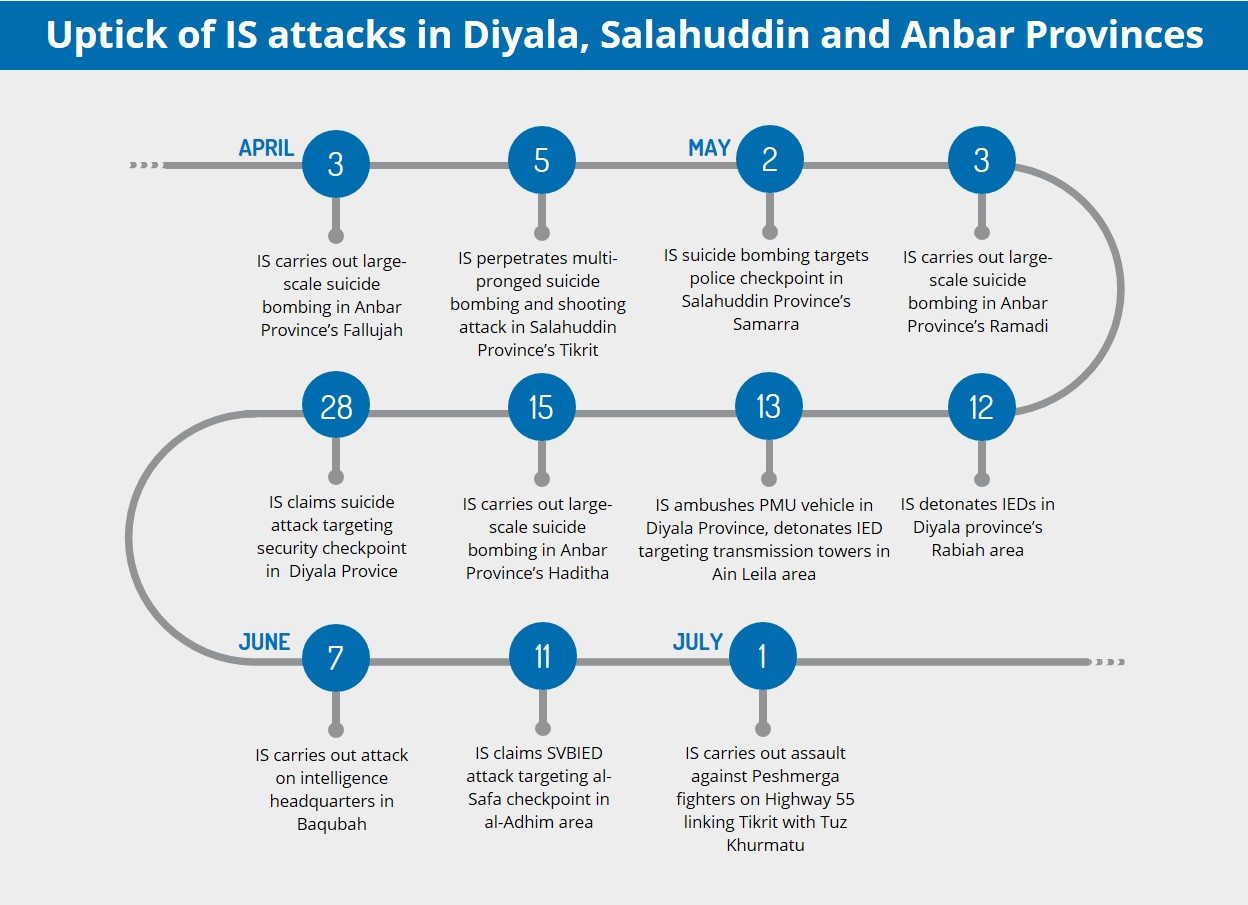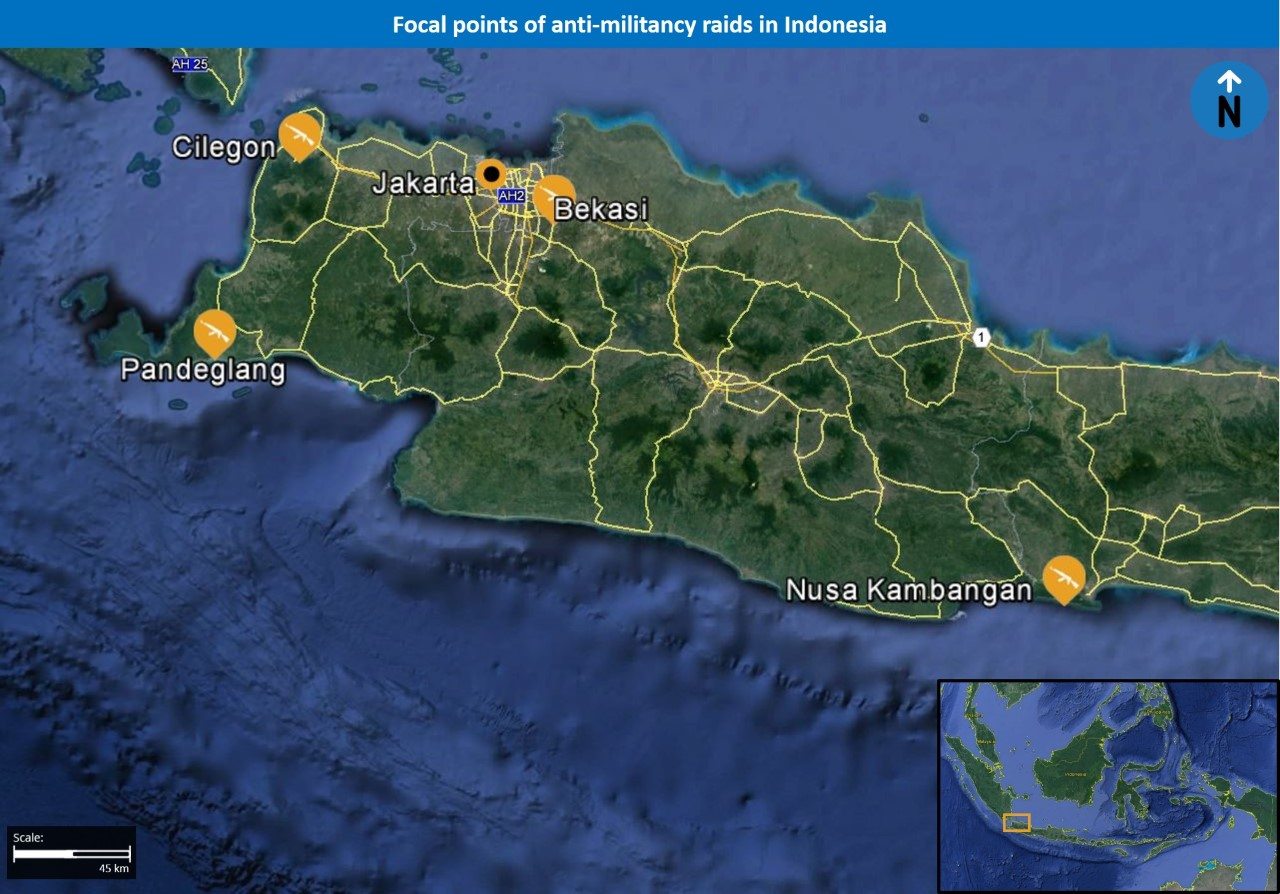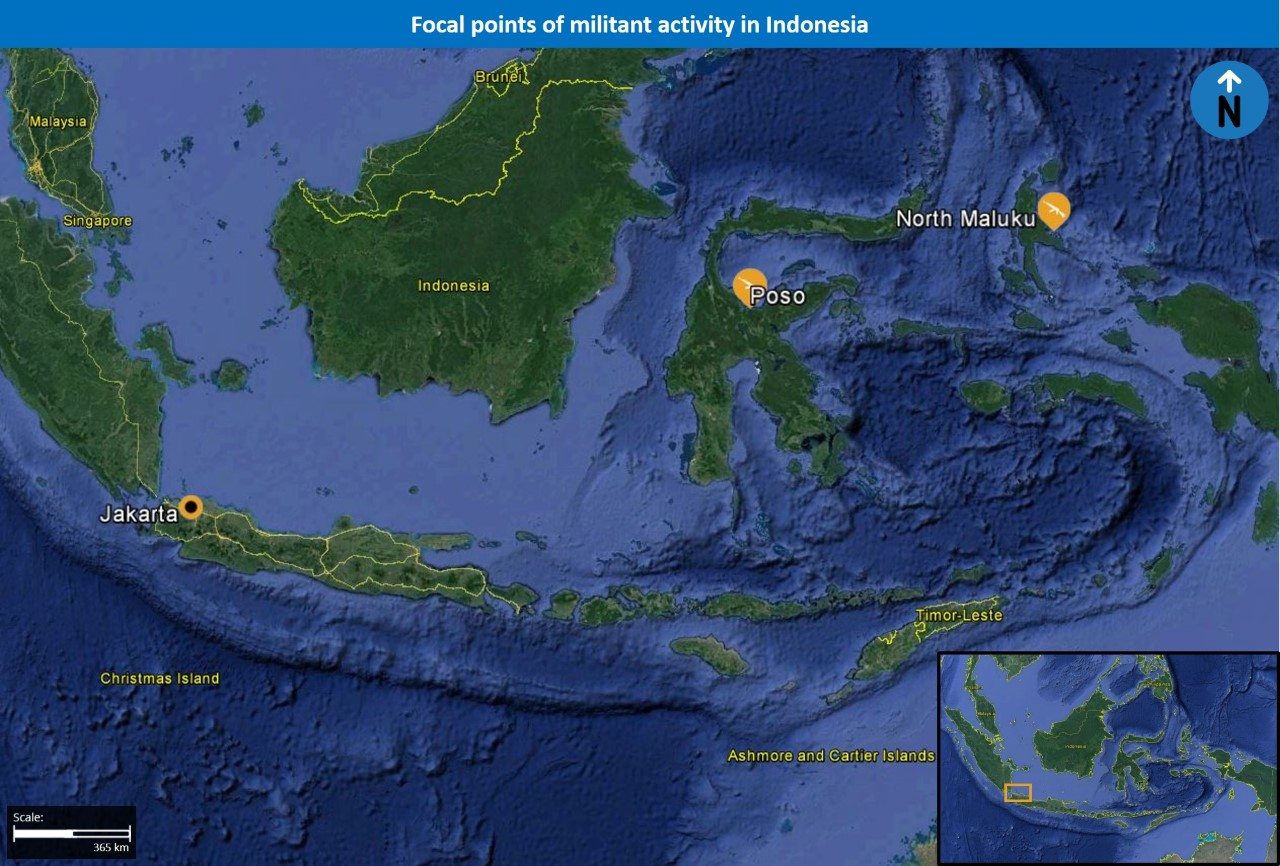Current Situation
Over the past weeks and months, a marked uptick of asymmetric attacks perpetrated by the Islamic State (IS) has been recorded in the Diyala, Salahuddin and central Anbar Provinces. For instance, in Diyala Province, on June 11, the group claimed responsibility for an SVBIED attack targeting the al-Safra checkpoint in the al-Adhim area, north of Baqubah. Five soldiers were killed and three others were wounded according to the group. Furthermore, on June 7, IS carried out an attack on an intelligence headquarters in the city of Baqubah according to IS-linked media. Finally, on May 28, IS claimed a suicide attack targeting a security checkpoint in Baqubah, which resulted in the killing of three people and the wounding of at least 13 more.
Meanwhile, in Salahuddin Province, on July 1, IS carried out an assault on Peshmerga fighters on Highway 55 linking the cities of Tikrit and Tuz Khurmatu. killing one Peshmerga officer. Furthermore, on April 5, IS had carried out a multi-pronged suicide bombing and shooting attack in the city of Tikrit, killing 31 people and wounding over 40. Finally, on May 2, another suicide bombing was staged by the Sunni jihadist militant group at a police checkpoint at the entrance of the city of Samarra, killing two security personnel.
Finally, in Anbar Province, large-scale IS-perpetrated suicide bombings targeting Iraqi Security is Forces (ISF) were recorded on April 3 in Fallujah, on May 3 in Ramadi, and on May 15 in Haditha.
Assessments & Forecast
The uptick of IS attacks in the aforementioned provinces comes amidst persistent territorial setbacks for the Sunni jihadist militant group to pro-government forces across Iraq, and chiefly the ongoing pro-government campaign to capture Mosul, which is liable to be completed over the coming weeks, thus resulting in IS’ loss of their prominent stronghold in Iraq. With this in mind, we assess that the increased number of asymmetric attacks in the aforementioned provinces is likely an effort of the Sunni jihadist militant group to establish a foothold in the Diyala, Salahuddin and central Anbar Provinces instead, as they lose their traditional strongholds, with the ultimate goal of obtaining a territorial control in these areas in the long-term. This is further underscored by reports indicating that IS is currently deploying fighters to villages at the border between the Salahuddin and Diyala Provinces, in a likely effort to capitalize on the low presence of pro-government forces in the area.
We assess that the increase of IS activity in these specific provinces is motivated by their ethnically mixed populaces, which includes a sizable number of Sunni Arabs. The fact that a significant portion of this population suffers from perceived marginalization by the Iraqi government, as well as reported cases of harassment of the local Sunni Arab populations by Shiite Popular Mobilization Units (PMU), makes these segments susceptible to sympathizing with the Sunni jihadist militant group. We further assess that the fact that a significant number of the aforementioned IS attacks have targeted PMU forces is likely an indication of the group’s attempt to further exacerbate sectarian tensions between the abovementioned communities in order to gain and expand support among Sunni Arabs. Such a calculus is likely motivated by the fact that attacks against Shiite targets are often met with acts of reprisal by PMU forces against local Sunni Arabs, such as the torching of Sunni-operated businesses and the targeting of Sunni mosques to a lesser degree. Such developments, in turn, are liable to result in increased support of Sunnis for IS.
Meanwhile, on a tactical level, such IS ambitions have likely been facilitated by the fact that the group has recently been able to renew its activities in the Hamreen Mountain range, which is strategically located between the Kirkuk, Diyala and Salahuddin Provinces and oversees the region. Furthermore, the mountains are located close to Highways 1 and 2 leading to Baghdad and bisecting Diyala and Salahuddin provinces, as well as to the cities of Tuz Khurmatu and Kirkuk, which are marked by frequent ethno-sectarian tensions. With this in mind, should IS be able to consolidate its presence in this mountainous region, this will likely increase their ability to launch asymmetric attacks in the aforementioned provinces and cities, and quickly withdraw to and take cover in the Hamreen Mountains following such acts of militancy. This is due to the fact that the rugged and mountainous terrain is liable to impede counter-militancy operations of pro-government forces launched in response. Additionally, IS may increasingly target Highway 1 and Highway 2, both main traffic arteries connecting Baghdad with northern Iraq, in order to hinder the Iraqi government’s attempts to rebuild and reconstruct the country’s northern regions after their eventual liberation from the Sunni jihadist militant group..
FORECAST: Over the coming months, given that the Diyala and Salahuddin Provinces are entirely held by pro-government forces, with IS lacking any consolidated territorial control at this time, we assess that the Sunni jihadist militant group will likely maintain, and possibly escalate, its high intensity of asymmetric attacks in central government-controlled locations, such as Baghdad and Ramadi. This would constitute an effort to force pro-government troop deployments away from these areas, in order to facilitate IS’ ambitions to gain a foothold in the Diyala and Salahuddin Provinces. Should such a scenario eventually materialize, the group may even capitalize on a broad deterioration of the security situation, thus setting the conditions to attain territorial control over parts of these areas over the long-term.
In light of the uptick in IS attacks in the aforementioned provinces, we assess that ISF forces will likely intensify counter-militancy raids targeting suspected IS militants in these areas over the coming weeks in an effort to mitigate the risk of further attacks by the Sunni jihadist militant group. With that being said, in light of the aforementioned rough terrain in which IS militants operate, the potential for such expected security measures to be successful remains very limited.
FORECAST:Furthermore, over the long-term, it remains possible that Iraqi authorities will attempt to reach out to the Sunni Arab populace, and particularly the local tribesmen, in these provinces by providing funds for development and improvement of infrastructure in order to reduce the appeal of IS in their eyes. Such a step could build on the successful 2007 precedent, when the Iraqi government channelled US-provided funds to Sunni tribes to fight against IS’ predecessor of the Islamic State of Iraq (ISI), which resulted in a significant decrease in the group’s activity across the country throughout 2007-2008. As a consequence, local support for the Iraqi government increased considerably, with the Sunni jihadist group’s influence almost entirely diminished, until US funding was discontinued in conjunction with the US military’s withdrawal from Iraq. That said, a lack of available funds at disposal of the Iraqi government, as well as likely opposition of Shiite PMU forces to such a policy, are liable to impede its feasibility.
Recommendations
It is advised to defer all travel to Baghdad at this time due to the daily threat of militancy in the capital, violence in areas surrounding the city, and the risk of a broad deterioration of security conditions. For those remaining in Baghdad, it is advised to ensure that contingency and emergency evacuation plans are updated. Contact us for itinerary and contingency support options.
We advise against nonessential travel to Basra. If travel is essential, contact us for itinerary-based consultation and on-ground support. Travel to areas outside of Baghdad and Basra should be avoided at this time, particularly to the north and west of the country, including the Anbar, Nineveh, Salahuddin, Kirkuk, and Diyala Provinces due to ongoing combat operations. This is in addition to avoiding the Babil Province, south of Baghdad. Those operating in these regions are advised to contact us for itinerary and contingency support measures, including evacuation options, given the deterioration in the security situation. Consult with us before traveling to Kirkuk City.
Travel to Erbil and Sulaymaniyah may continue at this time while maintaining heightened vigilance and adhering to standard security precautions regarding the threat of militant attacks. Avoid all nonessential travel in the Kurdistan Regional Government outside of Sulaymaniyah and Erbil.
Given the ongoing presence of Islamic State (IS) militants in bordering provinces and subsequent clashes with Kurdish Peshmerga, it is advised to avoid the vicinity of the KRG’s borders, and the disputed areas. Those operating natural gas or oil facilities are advised to obtain security consultation for facilities in outlying areas, specific to the nationalities and operational needs of their employees. As a general precaution, it is advised that any travel, particularly in outlying areas, be conducted in armored vehicles, with proper security escorts and coordination with authorities.





